Here's one that's been a long time coming for me. As someone who has been an avid Bowie listener since I was fifteen, only a few months or so before his untimely passing, and as someone who last year ranked as being in the top .01% of Bowie listeners on Spotify, I've wanted to write about Bowie's music for ages. First I figured it would be a YouTube series, then I thought it would be a podcast, but now I think I'm finally ready to do it in the form of a series of blog posts.
Bowie's music has meant so much to me over the years that I consider him my favorite artist of any medium. Of any artist of all time, I don't think there's anyone else who produced such a high volume of excellent art of many different mediums. His music is the crown jewel of course, but along with that he produced a handful of iconic performances in great films on the side as well, plus he threw in some unbelievably quality live performances.
All this being said, this post is going to center around all of Bowie's solo studio albums, in the order of worst to best according to my tastes. Other albums, tracks, and contributions I hope to talk about in later entries!
#27 Self-Titled (1967)
If you judged Bowie's talents solely based off of his first record, you'd never have guessed that he would go on to produce some of the greatest albums of all time. It's a tacky, kiddy rip-off of The Beatles' Sgt. Pepper and it has virtually no appeal outside of the somewhat catchy "Rubber Band".
What's especially bizarre about this debut is that it sounds absolutely nothing like anything David produced before or after this release. It's shocking to find out that even David's earlier work, such as "You've Got A Habit of Leaving Me", which he did with the group The Lower Third, sounds a thousand times better than this. At least that has a sort of pop '60s appeal, while this... this is just weird and awkward and not very good at all. The 1967 album is perhaps not as awful as I make it out to be, but it certainly isn't remembered for anything good.
#26 Pinups (1973)
This album, which happens to be the final release featuring Bowie's legendary character/alter-ego Ziggy Stardust, is not terrible, but it gets less credit due to it being comprised of all covers. So, no original Bowie material is to be found on the album, which is why many wouldn't even include this on their Bowie album ranking, along with the retroactively-termed "non-canon" David Bowie (1967). There are a handful of great covers on here in my opinion, but none of it has that magic that Bowie infused in his better, original projects.
#25 The Buddha of Suburbia (1993)
So, in compiling this list, I had remembered all of Bowie's outputs EXCEPT this one. That's very telling. It's pretty milktoast and not memorable. There are some early versions of some songs off of Outside, which are pretty good but still not what you get on Outside. I'm quite lukewarm on the good songs of this album, such as the title track, though the title track does have a sort of out of place insertion of an older and more popular Bowie song in the second half of it. Rather distracting, and done to much better effect in the "Hello Steve Reich" mix of "Love is Lost" done by James Murphy of LCD Soundsystem fame for The Next Day Extra EP. Of all the songs included on this record, which was actually done for a miniseries on British television, "Sex and the Church" is probably my favorite that's exclusive to this album.
If David Bowie (1967) didn't exist, Tonight would certainly be the most infamous Bowie record. With 1983's Let's Dance, Bowie proved that he could do pop music nearly as well as rock. Some would claim that he had sold out when he produced that record-- almost no one disputes that Tonight represents a true point of no return of lack of authenticity-- including Bowie himself, who referred to his later '80s records as his "Phil Collins period".
All of this to say, I don't mind Tonight nearly as much as everyone else seems to. If you were to poll Bowie fans and critics alike, this would probably be the most commonly derided album Bowie ever put out. Now, I do think that there are definite downsides to this album, such as the over-prevalence of covers, some of which I enjoy and others I don't. The album's title track actually comes from a cover of an Iggy Pop song that Bowie helped write for Pop's late '70s output Lust for Life. Here, Bowie opts for a bore-me-to-tears rendition of the song, featuring Tina Turner, twisting it to become an unfortunate ear worm.
Despite these things, I really like a few songs on this, including the iconic "Loving the Alien" and "Blue Jean" plus the unexpected reggae rhythms of "Don't Look Down". Then, of course, there's "Tumble and Twirl", which most people dislike but I feel like it could have come straight off of Let's Dance-- it retains that same neo-disco energy.
#23 Black Tie White Noise (1993)
After the commercial failures of his "Phil Collins period" in the mid-to-late '80s, he went off and tried to blend into a proto-grunge band called Tin Machine. After some releases with them, he came back to his solo career with yet another image change: an earnest representation of himself-- no frills, no alter egos or characters. No wonder this release begins with the instrumental track which Bowie composed for his own wedding with the Somali-American model Iman.
From there, we dive into a big mishmash of jazz-infused electronic tracks, all produced by disco master Nile Rodgers, who also produced Let's Dance. Much of it, I find, is an acquired taste, as on first listen on something like the title track or "Looking for Lester", they can come off a bit awkward and even obnoxious. This doesn't get in the way of some of the lyricism on some of these tracks. I think "Black Tie White Noise" is a really compelling reaction to the 1992 LA riots, and of course the lyrics on "Jump They Say" are haunting as hell, as they're in reference to Bowie's half-brother who had committed suicide less than a decade prior.
There are some other highlights here I think, such as with "Nite Flights" and "Miracle Goodnight", but I still think this represents a sort of clumsy re-introduction of Bowie to the wider public sphere.
#22 Toy (2000)
Ah, another covers album. This one has an interesting history behind it, however, and the performances on it are much more consistent and quality than on Pinups. Toy was originally recorded in 2000, and was slated for release then, but due to financial troubles with the label, the album was almost permanently shelved, only seeing the light of day in the form of bootlegs until the album's official posthumous release in 2021.
The interesting thing outside of its release has to be the content of the album itself. Instead of covering other artists, David revamped his own early work, some from before his debut album had even released. What makes this album special is hearing a much older man give his own twist on what he had produced in his youth.
There are some peformances on this that are truly touching, such as on the somehow even more saddening "Conversation Piece".
The final thing I'll say about this album is this: the final official cover is absolutely atrocious. Just slap a caption on a publicity photo from that time and you'd have a more quality album cover than this one, which just comes off as unsettling.
I feel like I have a special connection to 'hours...' simply because it was released on the year of my birth (and the year of Bowie's daughter with Iman's birth, go on to find out). While the cover art is again sort of lackluster, I've grown to enjoy it for its late '90s/Y2K gaudy aesthetic. Interestingly, the art depicts Bowie holding another, earlier version of himself. Sort of a commentary on his pension for cycling through characters, I believe.
As for the album itself, a lot of people dislike this one but I think it's gained a small and loyal following within Bowie's fanbase. 'hours...' is a strange entry in Bowie's catalogue in that it incorporates some soft rock/adult contemporary vibes into many of its songs. It's definitely not for everyone, but "Thursday's Child" is very relaxing to me, "The Pretty Things Are Going to Hell" is a surprising, almost out of place rocker, and "Seven" stands as one of Bowie's most emotional and heartfelt musings on mortality.
#20 Never Let Me Down (1987)
And here's the last Bowie album that most would say is bad. Me, I like it quite a bit for what it is-- a late '80s pop record. As far as those go, this is pretty damn good. Some of the mixing can be a bit flat, which is something that's mostly rectified on the 2018 version of the album, which was mixed by Mario J. McNulty, to a generally upwardly mobile effect.
As far as individual songs here go, there are no real undisputed classics, but I have my favorites. "Time Will Crawl" is a propulsive '80s pop rock anthem that never was-- and that was the "demo" song done by McNulty to prove that a new mix could "save" Never Let Me Down. The actual song "Never Let Me Down" is a rather bland but fun pop love ballad. I really like the 2018 mix of "Zeroes", which kicks off with a pretty impressive vocalization by Bowie which is mixed pretty low in the original '87 mix. Gotta love the Indian sitar as well, in that one. The best song on the album, without a doubt, is "Glass Spider", which starts with a one-and-a-half-minute (or so) monologue by Bowie, which reminds me of some of the whimsical spoken word work of Masayoshi Takanaka, and it's almost as fantasy-oriented. Once the music really kicks in-- damn! It's catchy. Not only this, but the 2018 mix really brings out the menace in the electronic drum and bass line that you couldn't hear as well on the original mix. I might be crazy, but it seriously sounds like an industrial or proto-industrial song when that element is raised in the mix. Love it.
A weird bit of trivia about this album is that Bowie had actor Mickey Rourke rap on one of the tracks on side B of the record. The song is "Shining Star (Makin' My Love)", and it's a hell of a cheesy ride, but I still kind of love it.
#19 The Next Day (2013)
In retrospect, The Next Day really feels like a test run for Bowie's final album, Blackstar. It's got some jazzy instrumentals on it along with some quite dark lyricism (such as "Valentine's Day"'s allusion to mass shootings) and blending of past themes in Bowie's discography to create something new. There are some cuts on here that could have come from Reality or Heathen, but somehow it fits in here.
The noteworthy aspect of this album's history is that it came after a decade-long time of silence in terms of major musical art coming from Bowie. He took a hiatus-- and who wouldn't, after a massive global tour in '03 and '04 which included some frightening moments for Bowie, such as a heart attack he suffered backstage at one of the shows and having a lollipop thrown in his eye during another performance.
One oddity about this album is that there were several great outtakes from the record that ended up on The Next Day Extra E.P. that would have done better on the album than off it. And considering there are a few songs that I don't care for on this one, I'd say that maybe some of these should have been swapped.
Some highlights on the actual album would be rockin' "The Stars Are Out Tonight", the vocally unique "Valentine's Day", and the downbeat "Where Are We Now?" that really sounds like it could have come right off of Blackstar.
#18 Reality (2003)
The more I age, the more Reality grows on me. Maybe it's the awful cover art that put me off so much in the past, in fact I regarded this as possibly the worst Bowie record for a little while. Yet, here we are, and Reality stands as a great, albeit somewhat overlooked, album from Bowie's late period. There are some straight up classics here, from the high energy "New Killer Star" to the cool, laid back "Days" and the menacingly beautiful and jazzy "Bring Me the Disco King". All of these great songs, along with a simpler acoustic rendering of "Rebel Rebel", the original recording of which remains one of Bowie's most popular, enduring hits.
As for the less great songs on the album, "Pablo Picasso" remains a lackluster cover of a classic The Modern Lovers song. The weird thing is, there was another cover of that song done by a punk group in the '80s, and it's a lot better than Bowie's version somehow. Perhaps there's just too much going on in the recording of the Bowie cover that I have distaste for it.
#17 1. Outside (The Nathan Adler Diaries: A Hyper Cycle) (1995)
Here's one that I'm sure threw a lot of people for a loop back when it was released: an industrial, largely electronic sound coming from David Bowie, world renowned rock artist. It's perhaps not as hard of a shift as between something like Diamond Dogs to Young Americans, but I imagine it was a surprise at the time. This album also stands as Bowie's final concept album, which is a form that he in part popularized in the early seventies. This time, Bowie imagined an entire world for this album to have come from, rather than just a character-- though I suppose 1974's Diamond Dogs was supposed to be music inspired by the novel 1984. In Outside's world, "art crime" becomes a popular occurrence, where murder is turned into a spectacle. I honestly haven't looked to far into the lyrics of this, but the darkness in these concepts definitely comes through in the music.
While "Hallo Spaceboy" famously brings back Bowie's famous Major Tom character that he mentions in the lyrics of several other songs of his with gusto and energy, some of my favorite cuts off of this are "The Voyeur of Utter Destruction (As Beauty)", with its winding backing guitar, "No Control" with its mellowed out (or perhaps more accurately, painfully yearning) vocals, and "Strangers When We Meet", which feels like a hopeful and light-sounding ending for the album.
#16 Lodger (1979)
Lodger, which was the third entry in Bowie's dubiously named retroactive "Berlin Trilogy", is pretty universally acknowledged as the lesser of the three albums, which include Low and "Heroes" as the other two entries. However, there are a lot of people who are willing to admit that while it's not as good as those two masterpieces, it is an interesting venture and a very solid album for David to close out the seventies with.
The concept behind this album is quite interesting, and something I wish Bowie would have returned to for another album. Essentially, its artistic conceit is in its mixing and matching of the various corners of world music and adapting them into a contemporary (for the seventies) rock record. For the most part, it really works! Bowie did his homework on this one and he adapts different styles of singing and instrumentation to great effect. This also contains two Bowie classics, "D.J." and "Boys Keep Swinging", which are both serious bangers.
Also, shout out to the 2017 Tony Visconti mix of the album, which gives it a more crisp and fresh sound. At times, the old mix sounds a little flat.
#15 The Man Who Sold The World (1970)
Aside from the title track, which is one of the best Bowie ever wrote, The Man Who Sold The World is a bit of a mixed bag for me. It manages to evoke a sort of proto-hard rock/metal aesthetic, which is super surprising for an album from 1970 with a man in a dress on the cover.
"All the Madmen" is a personal and interesting song for David, as it explores the history of mental illness in his family, "After All" is so well mixed that when Tony Visconti (the producer of the album) went to re-mix the record in the 2010s, he didn't even touch it, and "Saviour Machine" and "Width of a Circle" feel the most hard rocking out of all of the tracks on this.
The title track is legitimately fascinating lyrically and genuinely moving. It encapsulates all of the loneliness, yearning, and eeriness that one can handle in one recording. And even better, I believe, is the 1997 version recorded by Bowie and his more recent band as well as Brian Eno for what was compiled in 2020 as ChangesNowBowie. It is perhaps famous for being covered by Nirvana during their late MTV Unplugged live set.
#14 Heathen (2002)
After the unfortunate experience Bowie had with his Toy project in 2000, he started work on a new album which would end up becoming Heathen. From the first reversed guitar chords on the opening track "Sunday", you know you're in for a more experimental and dark ride. This is still very much rock, but it's a different flavor than what Bowie had ever done before.
Containing an excellent cover of The Pixies' "Cactus", Heathen also stuns with Bowie's incredible vocal performance on "Slow Burn". I'm also partial to "Afraid", and the moment when Bowie hits the lowest vocal note of his career on "I Took a Trip on a Gemini Spaceship" might be the sexiest moment in musical history.
Here it is: the bizarre theatrical music adaptation of Orwell's 1984 that came right after Bowie had killed off his most beloved and famous character of all: Ziggy Stardust. It's strange, alright, with many long and crazy instrumental disgressions with some of the strangest lyricism Bowie ever came up with. The opening monologue makes your spine tingle and the opening track ends with the proclamation, "This ain't rock and roll! This is... genocide!"
There are some really famous Bowie songs to come off of this, such as the legendary "Rebel Rebel", as well as the instrumentally tingling "1984". Some other tracks will be familiar to Bowie fans, such as the excellent "Rock 'n' Roll with Me", "Diamond Dogs", and the famous "Sweet Thing / Candidate / Sweet Thing" sequence of songs (which manage to feel like a precursor to Bowie's "Plastic Soul" era). This album is truly an experience first, though. This is the first album on this list that I would say is worth listening to every single song, all the way through in one sitting if you can.
#12 Earthling (1997)
Earthling is a full dive into what Bowie had explored in his prior electronically-inclined albums in the nineties. It is a full blown drum 'n' bass extravaganza, and it's surprisingly really good even from a drum 'n' bass enthusiast perspective. It might not have as much going on for the ambient type of drum 'n' bass music lover, but its energy is infectious. "Little Wonder" is a song that remains a great, aggressive banger to put on when you feel like screaming but you're in a crowded mall.
Then there's what's perhaps Bowie's biggest '90s hit, "I'm Afraid of Americans". Along with the title, which effectively portrays my inner essence perfectly, this is among my favorite hard rocking Bowie tracks. It features some fantastic production from none other than Nine Inch Nails frontman Trent Reznor, who also appears in the awesome music video for the song.
Also, to be clear about how awesome "I'm Afraid of Americans" is, there were FIVE remixes done of this song that were released on an E.P. later on. One of them is by Trent Reznor, which is probably the best one, and another features the rapper Ice Cube. Like Kelis' milkshake, "I'm Afraid of Americans" brings all the boys to the yard.
#11 "Heroes" (1977)
The second album in Bowie's "Berlin Trilogy" is perhaps the most famous of the trio, if only for its title track alone. While "Heroes" is an inspiring yet tragic love story, my favorite songs off of this would have to be "The Secret Life of Arabia" and "Blackout"-- though the live version of "Blackout" from Stage is a better recording than what was released on this album. There's also a good helping of instrumental tracks here, including "V-2 Schneider", which is possibly Bowie's most famous intrumental, besides another which I'll mention later...
Most might rank this lower in their own rankings of Bowie's discography, but I for one think this is a triumph. Not only does it contain the iconic song that kickstarted Bowie's mainstream success, "Space Oddity", it's got a great variety of folk-rock classics that are some of the biggest sleeper hits in Bowie's entire career. There's the epic "Cygnet Committee", which Bowie himself recognized as being a better song than "Space Oddity", as well as the absolutely devastating "Conversation Piece". I also love the supremely romantic "Letter to Hermione" as well as "Janine", "Wild Eyed Boy From Freecloud", and the closer "Memory of a Free Festival". I've named nearly every song on the album, but really, this record's great and quite underrated. It represents one of the more tender moments of Bowie's career.
Young Americans shows the first big shift in David's sound: from the weird rock 'n' roll theatrics of Diamond Dogs, we get an excellent soul record. Bowie called this period/genre "Plastic Soul", as he viewed a white Englishman making soul music sort of a counterfeit for the genre. However, that's not to say it's lackluster in any way. From the title track to the funky "Right", the cover of The Beatles' "Across the Universe", as well as an actual collaboration with John Lennon on "Fame", this is just a fun record. At the time, I'm sure many were afraid that Bowie was getting too big for his britches, too ambitious, but that was thankfully never the case.
There are some songs that didn't make it onto this album that came from the same sessions that are also essential. "It's Gonna Be Me" and "Who Can I Be Now?" both deserved to be on this, probably over some of the songs that actually made it on the record. But still, a quality album overall.
#8 Let's Dance (1983)
This record is both famous for being another successful genre switch for Bowie, and some would say it is simultaneously infamous for being the beginning of Bowie's "Sell Out" period. Others have said this before, but I have to echo their sentiments: if this is selling out, I really don't care because this sounds fantastic. This was Bowie's first team up with Nile Rodgers, and damn, the production is just so good, and helped define the pop coming to the rest of the eighties as well as the "British Invasion"/New Wave movements of that decade.
With possibly the best three-hitter in pop music history, David puts the elating "Modern Love", the cool "China Girl", and of course "Let's Dance" as the first songs on the album. I'll admit, the rest of the album doesn't perhaps live up to the first three songs, but after you get through the snorer "Without You", which comes right after "Let's Dance", you've got a quartet of underrated Bowie cuts. "Criminal World" famously censors the lyrics to make them more "straight" for a David that was sick of being so closely associated with his sexuality in the United States, but the song is great otherwise.
Then you've got "Cat People (Putting Out Fire)", which is a rework of the song Bowie did for the film remake "Cat People" in 1982 with the legendary synth keyboard maestro Giorgio Moroder. I actually like the "Let's Dance" version of this song better, probably because that's the one I "grew up" with, so to speak.
Overall, this is still one of the best eighties pop records. That might be a few descriptors that keep it from being a "greatest of all time" for many, but I still love it in all of its catchy glory.
#7 Blackstar (2016)
This is an extremely special album to me on multiple levels. It was the first Bowie album I was tuned into the release cycle for, I owned it on vinyl, and famously it came out only days before Bowie's passing. Blackstar is a harrowing, deeply melancholy experience. Whenever I listen to it, I have to listen to the whole thing. I couldn't imagine just listening to the singles, or one track or another, it's just such a singular experience that I can't imagine it any other way. It makes it clear that, going back as far as Reality, everything in Bowie's 2000s and 2010s was leading up to this achievement. All of the jazziness and darkness experimented with on those three albums before this one just feel like practice.
The first song, the title track, comes as one of David's most progressive tracks ever. It's got rocking drums, a droning, ominous opening and phantomic vocals throughout, mixed with some classic Bowie pop vocals and jazzy sax, which was Bowie's first instrument, if I remember correctly. The tragedy with the first track is that David actually had to cut it down to under ten minutes because of some rule with Apple Music and how singles can't be longer than that or something. I really hope we get the extended version someday.
The lyricism is just brilliant across all of the songs on this album. It's brooding and dark and contains some of the most swearing Bowie ever did in his music, and it's extremely effective at giving off the sincerity and urgentness behind the music. Bowie was dying of cancer during the production of this album.
Also, the texture of the sound is nearly unparralleled. "'Tis a Pity She Was a Whore" starts with drums and a backing track of Bowie just breathing. It's haunting. Much of the drum sounds and production was done by James Murphy. There's also the sound of dollar bills being rubbed up against each other on "Dollar Days", which adds to that song's atmosphere as well. The vocals and lyrics on "Girl Loves Me" are so severe, with Bowie's voice cracking as he pleads out the lyrics, which are equally as desperate.
Not only all that, but the music videos for this album are incredible too, particularly "Lazarus". It's just so memorable-- and, well, haunting-- that you can't possibly not think of the image of an old Bowie floating lightly over a bed and eventually closing a bureau on himself while listening to the song.
The final song on the album, "I Can't Give Everything Away", sends us off on what feels like a lighter note musically, but its lyrics reaffirm that when you know you're dying, there's only so much you can do. If there's any song that makes me feel like crying on this album, it's this one.
This is the first record on this list that I would unreservedly call a masterpiece.
#6 Scary Monsters (and Super Creeps) (1980)
There's perhaps no album that sounds as singular an entity (in terms of sonic quality) than 1980's Scary Monsters. From the first chords of electric guitar on "It's No Game (Pt.1)", we get a precise feeling that never falters throughout the record. Even Blackstar, though it's a singular experience, sounds much more varied than this. That's not to say Scary Monsters is one-note, not at all. It just has a range that it does exceptionally well that lands squarely between Bowie's art rock "Berlin era" and his pop era. It strikes such a balance between those two, it used to be my favorite Bowie record for that reason.
The three biggest songs off the album are awesome, in particular the self-referential tragedy of "Ashes to Ashes" and the funky danciness of "Fashion" are some personal highlights.
I also love some of the lesser known tracks on this one, like "Up the Hill Backwards", which sounds like the best unused anthem for a John Hughes teen comedy that never got made, and "Because You're Young", which has some amazing guitarwork that seems to play with the synth noodling throughout the song.
#5 Aladdin Sane (1973)
Now we're really talking. Aladdin Sane used to be one of my least listened to Bowie records, but in the last couple year my attention to it has skyrocketed. It's one of Bowie's most hard rocking albums, and of course it's famous for being the final studio album featuring Bowie's most famous creation, Ziggy Stardust. Described in numerous places by Bowie as being "Ziggy Goes to America", you can't help but see that reflected directly into the music, with its bluesy piano and guitar that weave through this record like the tightest lace through the tightest bodice.
There are near-countless highlights here, from the opener, the avant-garde piano on the title track, the doo wop-style vocals on "Drive-In Saturday", the heaviness and howling vocals at the beginning of "Panic in Detroit", my personal favorite "Cracked Actor" with its unsettling storytelling, the operatic "Time", all the way down to the classic "The Jean Genie" and the touching "Lady Grinning Soul".
Re-listening to this gave me some serious chills, it's just that good. Oh, and the album cover would go on to be one of Bowie's most famous looks. It is absolutely striking.
#4 Low (1977)
The first installment of the "Berlin Trilogy" is the absolutely awe-inspiring Low. The combination of experimental electronic instrumentation with a groovy post-Station to Station rock 'n' roll provides some of the best sounding music Bowie ever produced, this time in collaboration with electronic music pioneer Brian Eno, who also worked with Bowie on "Heroes", Lodger, and Outside. From the first moments of the record on "Speed of Life", you get a completely recognizable, iconic, and unique blend of sound that proves to open up one of the greatest art rock albums of all time. The entire project is an opus, a masterpiece of visionary music production.
This is also one of Bowie's darker records, as its title references a sort of low point in David's life, which was at the height of his cocaine addiction in the year prior to this album's production. There are tracks that seem to convey a great deal of alienation, like the opening to "New Career in a New Town" as well as the apocalyptic "Warszawa".
Since I tend to prefer the cuts on here with vocals, I'd say some of my favorites are "Be My Wife", the transcendent "Sound and Vision", which was covered later by the musician Beck in a mind blowing modern rendition, and "Breaking Glass", which is among my favorite Bowie tracks ever, with its howling vocals and warbly guitar.
Since I tend to prefer the cuts on here with vocals, I'd say some of my favorites are "Be My Wife", the transcendent "Sound and Vision", which was covered later by the musician Beck in a mind blowing modern rendition, and "Breaking Glass", which is among my favorite Bowie tracks ever, with its howling vocals and warbly guitar.
#3 Hunky Dory (1971)
I've said it once and I'll say it again, every single song on Hunky Dory is at least good. Most are beyond good, but that label alone sets this apart from most other albums. And this goodness ranges from "Kooks", which is just good, to "Changes", which is one of the best songs ever written, and my personal favorite Bowie song. It's not only a song that you can listen to in the background pleasantly, it's a song that if you listen to deeply it reveals a whole new dimension of meaning and emotion. Few other songs are so amazingly accurate at portraying the heartache and ecstasy of growing up and, well, just life changes in general.
And "Changes" is the opener for the album. Holy hell. What an introduction. Beyond that my favorites are "Oh! You Pretty Things", "Queen Bitch", the incredibly energetic "Andy Warhol", and of course "Life on Mars?", which contains some of Bowie's most touching and impressive vocal work.
One of the outtakes from this album, "Shadow Man", was released in demo form on the compilation of outtakes and live performances from this era called Divine Symmetry. I think "Shadow Man" could have been another classic, if only it would have replaced "Kooks"-- but again, "Kooks" ain't all that bad.
From the very first drum beats of "Five Years" to the final strum of the violin that ends "Rock 'n' Roll Suicide", this album feels intensely operatic, intensely emotional, and intensely vibrant. This is sort of the concept album to end all concept albums, as well, and it sort of birthed the popularity of the form. The entire conceit of the ideas behind the album-- a rock messiah alien in the years prior to the end of Earth-- is something that was incredibly creative for the time, and still remains an audacious and fascinating way to contextualize an album. And this, despite what I say about my #1, is the album that Bowie was born to create. It's what everything before it leads to and what everything after it is informed by.
"Five Years" feels like an impassioned kiss goodbye to humanity, as does "Rock 'n' Roll Suicide"-- my favorite song off the album, and a song that has made me cry multiple times from its sheer emotional weight and power.
Some songs don't obviously connect to the main theme, such as "Soul Love" or "It Ain't Easy", but they still feel like they belong. Like several of his other albums, everything has this singular sound, the entire album is an experience as a whole, but each song holds well on its own as well. So many classics here-- I'd list them all as such aside from "It Ain't Easy", which should have been replaced by either of the magnificent outtakes off the album, "John, I'm Only Dancing" or "Velvet Goldmine". Hell, even Bowie's covers of the Jacques Brel/Scott Walker songs "Amsterdam" or "My Death" could have replaced it and fit right in.
This album encapsulates so much of a musical and cultural era, it just feels like the time it was made, but it's also one of the best aged albums you could ever listen to. It sounds just as fresh as it always did.
And you've gotta give a shout out to all the gay shit in these songs. "Squawking like a pink monkey bird", "I'll be a rock 'n' rolling bitch for you"-- Yeah, David, we know what you're talking about, and we love you for it.
#1 Station to Station
Ladies and gentleman (and others...), we've reached peak Bowie. Err, maybe that's the last album, but in terms of all around quality, this is my favorite. Not only is it a dazzling and emotional tour de force, this record is nothing but hits. Not necessarily all songs that did well commercially, but there's not a song on here that feels worse than the rest. It's all very consistently the best (in my opinion).
The opening title track might be runner up for my favorite Bowie song-- hell, song in general-- of all time. The slow opening that builds and builds until Bowie's cool, detached vocals come in, the intricate and fascinating lyrics, the several unique phases of the song, it's all an opus. I would pay quite a bit of money to have seen Bowie just play this song alone, let alone the whole album or a setlist of material from all over his career. I love the darkness of the Thin White Duke's (the persona Bowie invented for the project) presence on the record. I love how the song seamlessly jumps from deeply menacing guitar noise and explosive drums to the absolute euphoria of the change halfway or so through the ten minute song. It becomes a sort of hyper-disco, a disco that's so disco that it burns into your gums with its candy-like sweetness. Along with the lyrics, "It's not the side effects of the cocaine, / I'm thinking that it must be love", it's simultaneously awe-inspiring and euphoric as well as terrifying and depressing.
Bowie made this in a period that he would later go on to admit he didn't remember later on in life. He was on that much cocaine. He'd later say that the song "Word on a Wing" was a cry for help, which is devastating, but my God, it's... brilliant to an inhuman level. It's so sad but in this dramatically heightened state that you can't help but be absorbed.
"Golden Years" is probably the most "pop-y" of all the songs on this album, and it does convey a sort of warmth and soul that towers over "Young Americans" with a devilish smile. But that's what it feels like, it almost seems like it's written from the perspective of cocaine, trying to seduce Bowie into just one more hit. It's diabolical, and it's so catchy and textured and great.
The rest of the songs are all masterpieces too, even the criminally underappreciated "TVC15", which in Bowie's words is the story of a girl who falls in love with her television set. It combines the bizarre thought processes of an addict with the swinging fun of a pop song.
I realize that all my commentary on this album might come off as insensitive or callous or just strange, but it's how I feel-- I feel sympathy for what the man went through, but he just happened to create one of the best pieces of music I've ever listened to in the process, and the content therein has even more dramatic weight because it toys with the darkness of his life at the time as a foil against the vibrant life of music. That dichotomy will never not be fascinating to me.

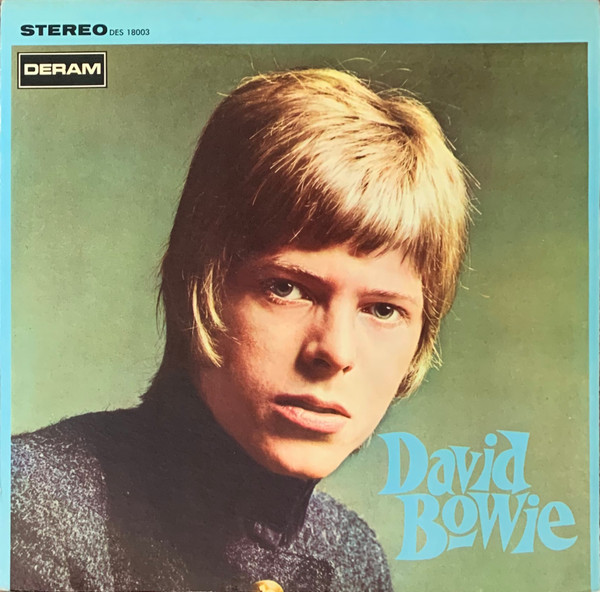


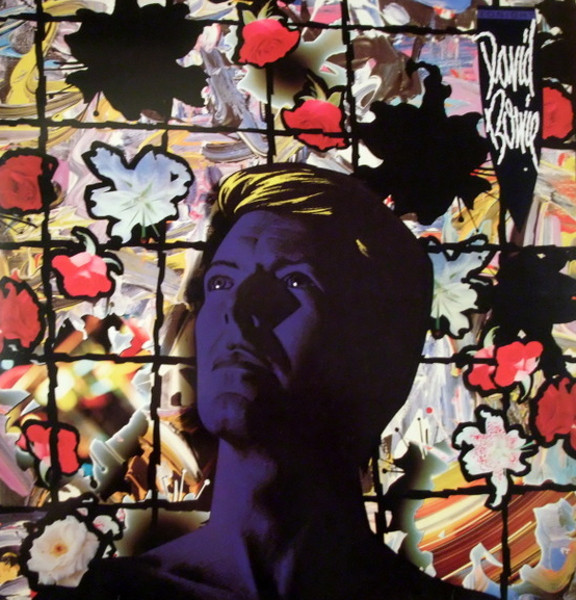




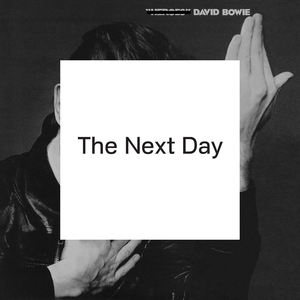



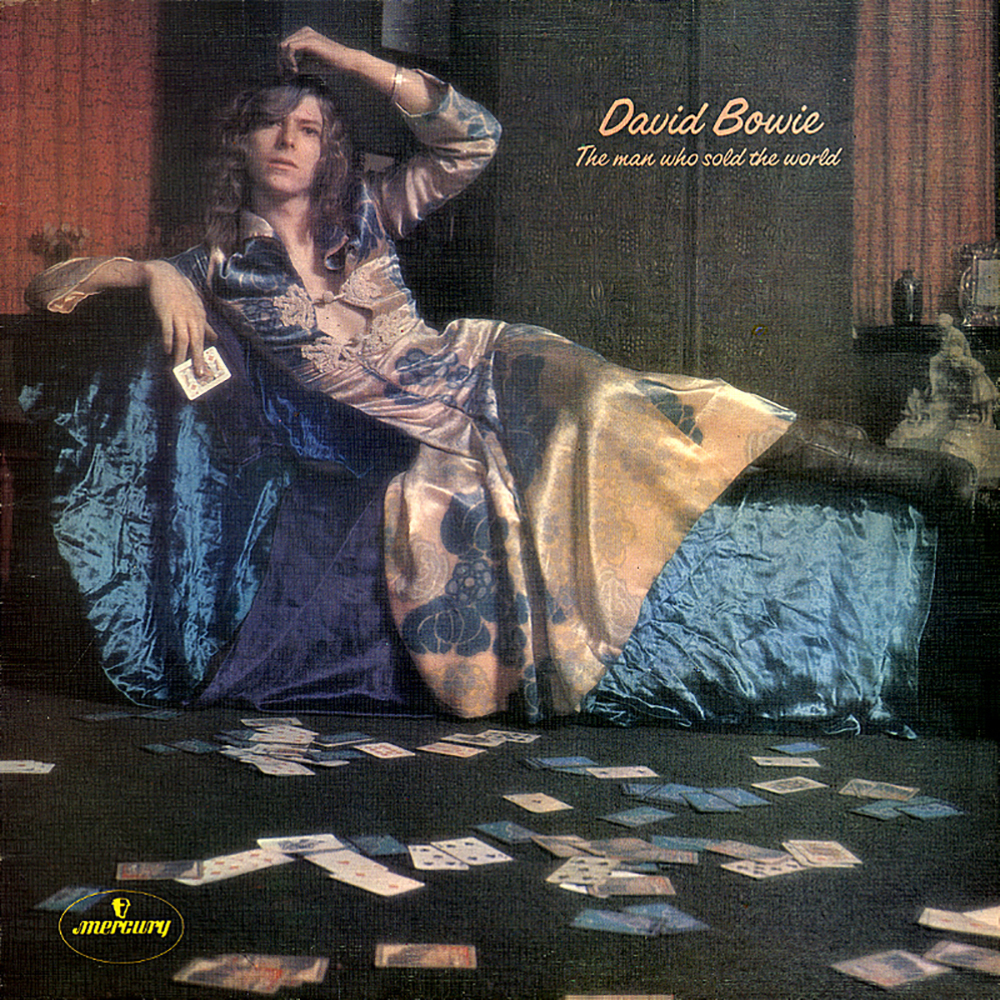
.jpg)




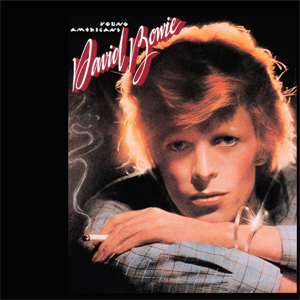

.svg/800px-Blackstar_(Front_Cover).svg.png)
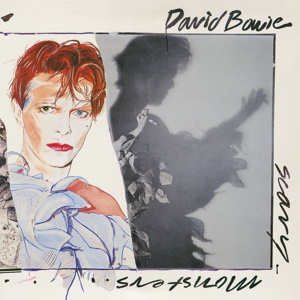

.jpg)

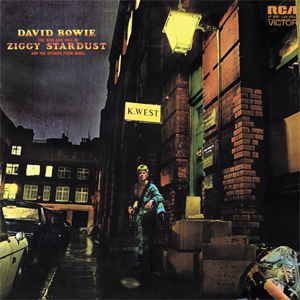
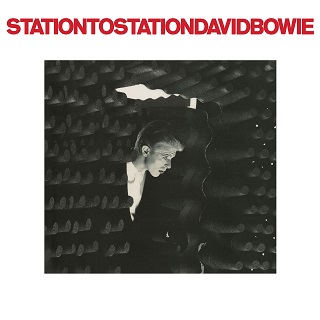



No comments:
Post a Comment
Note: Only a member of this blog may post a comment.